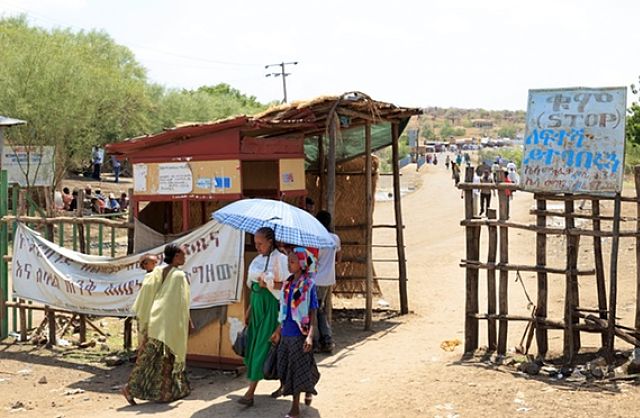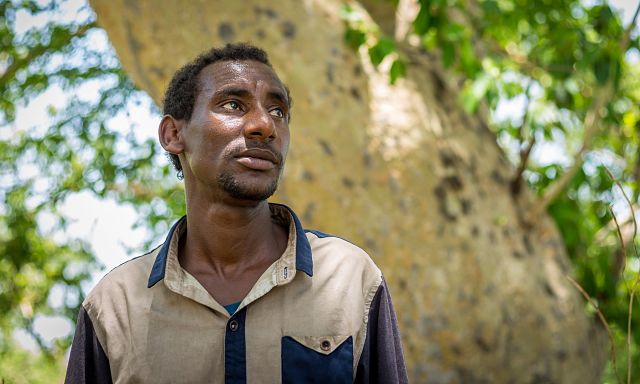 A checkpoint in Metema, Ethiopia next to the border with Sudan. The town is now a centre of a booming trade in migrants from Ethiopia, Eritrea, Somalia and Sudan. (Photograph: Mulugeta Ayene/AP)
A checkpoint in Metema, Ethiopia next to the border with Sudan. The town is now a centre of a booming trade in migrants from Ethiopia, Eritrea, Somalia and Sudan. (Photograph: Mulugeta Ayene/AP)
Tuesday 25 August 2015
Metema, Ethiopia — The mood in the border town of Metema these days is quiet and watchful.
Dozens of houses on the hot, dusty main road that stretches from Ethiopia into Sudan look as if they have been closed in haste. Guards grimly patrol the border, stopping anyone who looks as if they are trying to cross illegally. The nightclubs and bars are emptier than usual, although they still attract Sudanese who cannot drink alcohol in their own country under sharia law.
Metema, with a population of some 100,000 people, is one of a handful of towns across the region that serve as feeders for a booming trade in migrants from Ethiopia, Eritrea, Somalia and Sudan, with many hoping to make their way to Europe. Life has become a cat-and-mouse game: the authorities are cracking down, yet the migrants just keep coming, often risking death.
Since 30 Ethiopian Christians who passed through Metema were killed by the Islamic State (Isis) group in Libya a few months ago, the Ethiopian government has become much more vigilant. It claims to have detained 200 smugglers across the country, and police say about 28 of them are from Metema.
In Metema, the effect of the crackdown is clear. But while the flow of migrants has dropped from about 250 a day, it’s still strong at 100 to 150, according to Teshome Agmas, the mayor. “It’s just a pity that people choose to endanger their lives in an effort to move out of their country and work in inhumane conditions abroad,” he said.

Getachew Merah, a 30-year-old migrant from Ethiopia, stands by a tree near Metema, June 2015. Photograph: Mulugeta Ayene/AP
Getachew Merah, a rail-thin 30-year-old aspiring migrant from Ethiopia, has made three unsuccessful attempts to cross into Sudan, and is now trying again. He said his father is dead and his mother lives in extreme poverty in a rural village in the Amhara region.
Merah has tried just about every job in Ethiopia. He’s worked as a butcher, a guard, an assistant in a heavy-duty truck, a labourer carrying oil back and forth from between Sudan and Ethiopia and more. But he simply can’t get enough money to change his life or his family’s. He hopes to earn money in Libya to send back to his family, and eventually return to start his own business.
—
Join the conversation on Twitter and Facebook.

























